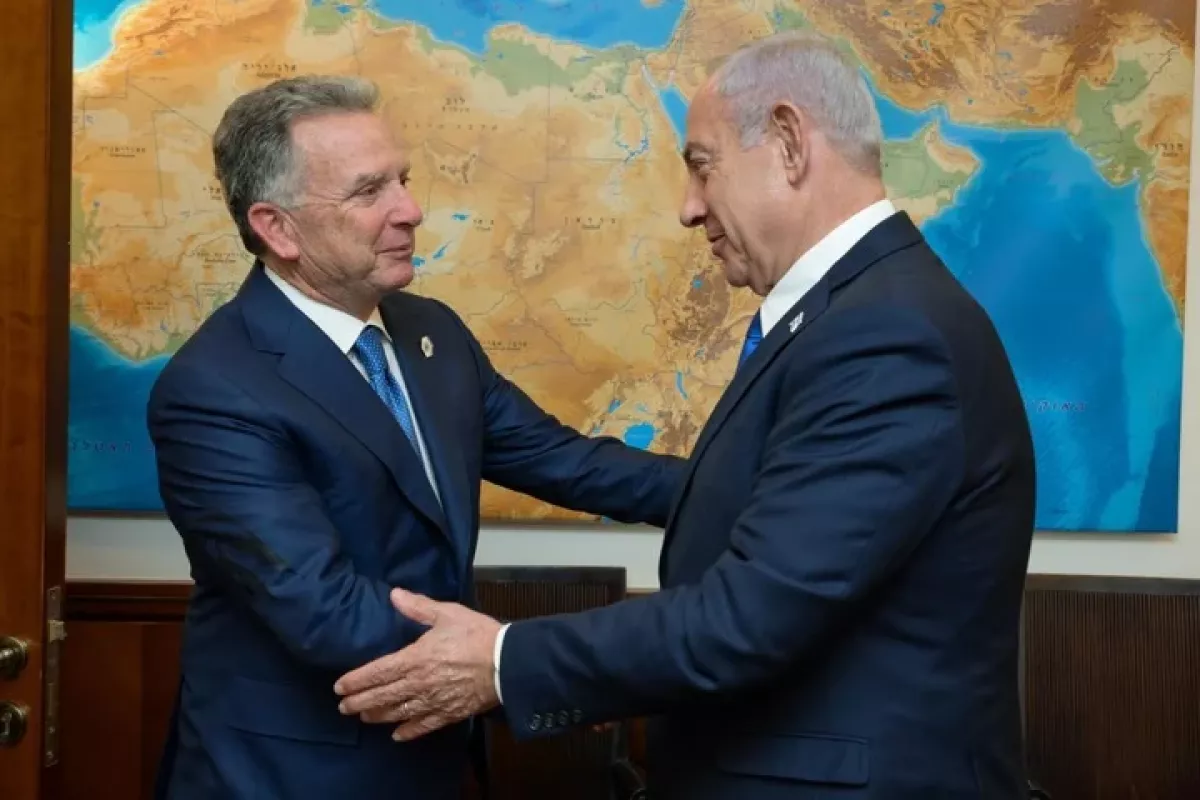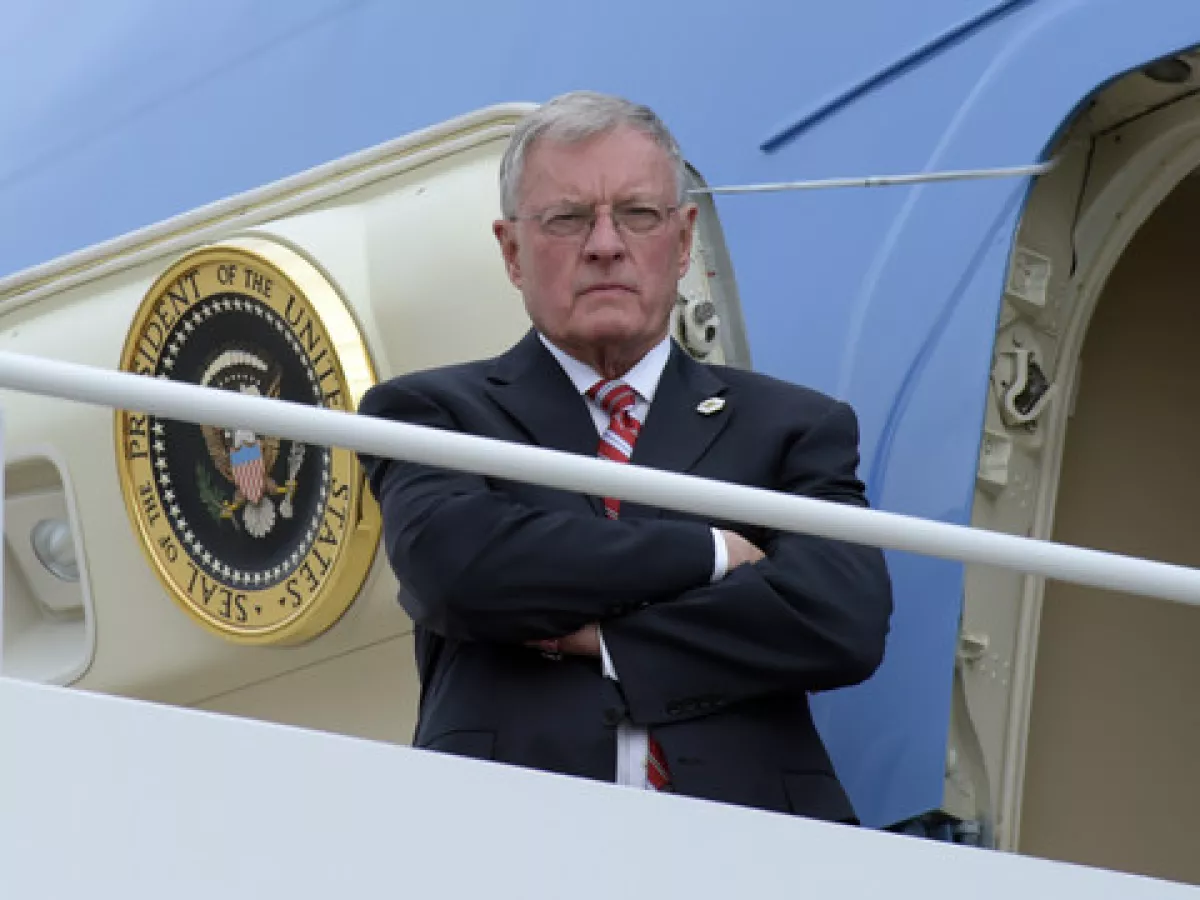All you need to know about Trump's representatives to Middle East, Ukraine Special Envoys Steven Witkoff and Keith Kellogg
US President Donald Trump has assigned several key cabinet members to address the country’s turbulent foreign policies and fulfill his campaign pledge to voters: reducing costs by ending American involvement in overseas conflicts. Secretary of State Marco Rubio has been a familiar figure in international politics due to his long tenure in the US Senate and his brief 2016 Republican presidential candidate run against Trump. However, Washington’s special envoys for Ukraine and the Middle East remain lesser known on the global stage.
Special Envoy to the Middle East Steven Witkoff has been omnipresent in the international news cycle in the last few weeks given his deep involvement in ceasefire negotiations between Israel and Hamas. Despite his prominence in these talks, the attorney-turned-real-estate-mogul is new to global diplomacy. Meanwhile, Trump’s selection for Special Envoy to Ukraine, Lieutenant General Keith Kellogg, has spent nearly half his life in military service and while more is known on his policy positions, he was a new face to the international community before arriving at the Munich Security Conference this week. His announcement at the conference on February 15 that that a peace plan for the two warring nations could come within days or weeks has sent shockwaves through the room filled with European leaders. A war veteran of Trump's first administration, he previously held multiple national security roles and played a part in shaping US policy on Ukraine.
In the article ahead, Caliber.Az provides an overview of these two pivotal officials, exploring their backgrounds and how their past experiences might influence their future positions on these pressing geopolitical issues.
Steven Witkoff
He is a Jewish-American real estate investor, developer, and the founder and CEO of the Witkoff Group, a prominent real estate investment and development firm based in New York City. Donald Trump has praised him for being a tough negotiator, a skill he earned by acquiring, developing, and repositioning high-profile commercial and residential properties, particularly in New York, Miami, and Las Vegas. He could hardly have a more different profile from those of American diplomats who usually are responsible for drafting complicated international agreements.
He was born and raised in New York City, according to his company's website. After graduating with a law degree from Hofstra University, he worked as a real estate attorney for the New York law firm Dreyer & Traub, where one of his clients was Donald Trump. They became friends while working on a business deal and Witkoff gained valuable experience navigating property transactions and legal complexities in the real estate sector.

In the late 1980s, Witkoff left his legal career to focus on real estate investment and development. He initially began acquiring undervalued residential buildings in New York City, particularly in areas that were undergoing gentrification. Recognizing opportunities to revitalize and transform properties, he steadily built a portfolio of commercial and residential assets.
In 1997, he founded the Witkoff Group, which has since grown into one of the leading real estate firms in the United States. His business model focused on acquiring distressed properties, adding value through redevelopment, and repositioning them for higher profitability. President Trump introduced Witkoff as his pick for the Middle East position, arguing that he was the best negotiater
Some of his most notable high-profile real estate projects include:
The Park Lane Hotel (New York City) – Acquired in 2013, this historic luxury hotel overlooking Central Park was reimagined as part of Witkoff’s portfolio.
The New York Edition Hotel – Located in the iconic Metropolitan Life Insurance Company Tower, this hotel was developed in partnership with Marriott and Ian Schrager.
The West Hollywood Edition (Los Angeles) – A high-end hotel and residential project in collaboration with Marriott's Edition brand.
The Fontainebleau Las Vegas – In 2017, Witkoff purchased the long-stalled Fontainebleau casino project on the Las Vegas Strip, renaming it The Drew Las Vegas before eventually selling the property.
111 Murray Street (New York City) – A luxury residential skyscraper in Manhattan's Tribeca neighborhood.
Personal Life and Philanthropy
Witkoff is known for his philanthropic efforts, particularly in education, healthcare, and Jewish charities. He has donated to various causes, including funding scholarships and supporting community development programs.
US media outlet NBC has cited a person familiar with the Israel-Hamas negotiations, describing Trump's representative as having brought “a new energy and a new dynamic” to the table. “He’s very much engaged and his heart is in the right place,” the publication cited.
Another Middle Eastern diplomat spoke to the outlet on condition of anonymity saying that Witkoff, as well as being a tough negotiator, revealed details about his son Andrew, who died of an OxyContin overdose in 2011 at age 22, telling “officials he empathizes with parents who have lost children on both sides.”
Lt. General (Ret.) Keith Kellogg
Joseph Keith Kellogg has been named the US Special Envoy for Ukraine and Russia under President Donald Trump’s administration. Born in Dayton, Ohio, in 1944, a website dedicated to veterans of the US war in Vietnam writes that Kellogg dedicated nearly half his life to military service.
Military career
- At 23, he fought in Vietnam with the 101st Airborne Division as a US Army special forces officer.
In 1989, he commanded a brigade during Operation Just Cause in Panama.
- During Operation Desert Storm in the Gulf War (1990-1991), he served as Chief of Staff of the 82nd Airborne Division.
- In 2003-2004, he was Managing Director of the Coalition Provisional Authority in Iraq.
He retired at 59 with the rank of Lieutenant General. After leaving the military, Kellogg worked as a security consultant at US software giant Oracle, later serving as Executive Vice President of CACI International. In 2009, he became Senior Vice President at Cubic Corporation, a security industry equipment manufacturer.
Kellogg has been married for 44 years and has three children. His wife, Paige, is also a former US Army officer who took part in the US operation in Grenada with the airborne forces. Their daughter, Meaghan Mobbs, leads the R.T. Weatherman Foundation, a charity supporting Ukraine by providing humanitarian aid, helping soldiers with mental health recovery, and repatriating the remains of US citizens who died in Ukraine.
In Trump’s first administration
Following Trump’s 2016 election victory, Kellogg became Chief of Staff and Executive Secretary of the US National Security Council. He also briefly served as National Security Advisor.

According to Ukrainian media, Kellogg was present during the controversial 2019 phone call between Trump and Ukrainian President Volodymyr Zelenskyy, which nearly led to Trump’s impeachment. The call centered on allegations that Trump pressured Zelenskyy to reopen an investigation into Joe Biden’s son, Hunter, who had ties to the Ukrainian energy company Burisma. Kellogg later testified, stating he heard nothing inappropriate.
He was also at the White House with Trump during the January 6, 2021, Capitol riots. Kellogg supported Pence’s decision to remain in the Capitol despite security officials urging an evacuation. Trump, however, criticized Pence for not attempting to block Congress from certifying Biden’s victory.
Trump cited Kellogg’s military and business expertise, as well as his national security experience, in justifying his selection.
Policy and Ukraine Peace Plan
Since 2021, Kellogg has been a key figure in the America First Policy Institute (AFPI), which has shaped national security proposals for a potential second Trump administration.
In a November 2023 AFPI article, Kellogg warned against granting Ukraine NATO membership while Russian forces still occupied Ukrainian territory, arguing that doing so could derail peace efforts and risk direct US military involvement with Russia.
In it, he wrote: "America’s NATO allies are contemplating fast-tracking NATO membership for Ukraine 'after the war' has ended. This war, however, will likely end in a stalemate in which Ukrainian territory is still occupied by Russian forces with a ceasefire in place rather than a decisive military victory by Ukraine.
Granting Ukraine NATO membership in this context threatens to derail peace efforts toward a permanent end state while also risking an American military engagement with Russia.
Reaching a negotiated end state in the Russia-Ukraine conflict is possible, but it will require moving beyond the provocative NATO membership option."
In 2024, AFPI published a report co-authored by Kellogg and Fred Fleitz, outlining a strategy to end the Russia-Ukraine war. The plan proposed diplomatic, military, and political measures aimed at securing a ceasefire and a regional power balance.
It emphasized making the peace plan an official US policy, tying future American aid—likely in the form of loans—to Ukraine’s willingness to negotiate with Russia. The plan suggested that if Ukraine agreed to peace talks, it could continue receiving US military assistance, but if Russia refused to engage, US support for Ukraine would increase.
US news giant CNN reported that Kellogg has proposed freezing the front line through a ceasefire and creating a demilitarized zone. Under this proposal, Russia would receive limited sanctions relief, with full relief contingent on signing a peace deal favorable to Ukraine.
The plan also stated that Ukraine would not be required to abandon its goal of reclaiming Russian-occupied territories but would have to pursue this diplomatically.
By Nazrin Sadigova








